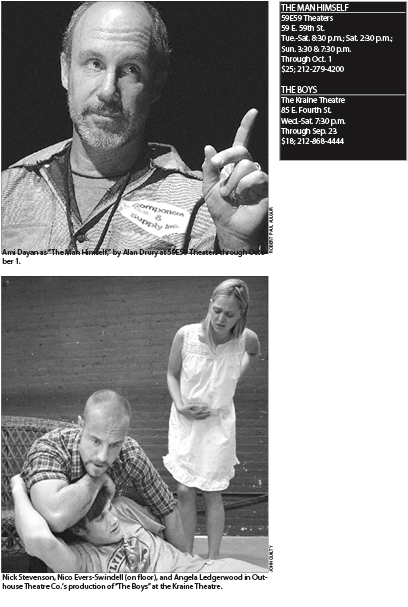The religious wrong; hunting for Bambi
BBY CHRISTOPHER BYRNE
Alan Drury’s “The Man Himself” is a fascinating, if flawed, one-man show about belief and how it develops. It’s been adapted for the American stage and is performed by Ami Dayan, who gives a solidly understated performance that’s never less than compelling.
The 60-minute piece tracks the path of Michael, a disaffected parts manager at an electronics company in Southwest Denver, and how he is seduced into believing in a kind of radical fundamentalism. Michael’s belief is never inflamed or particularly passionate; it’s the result of a half-hearted, unwilling personal journey and search for meaning after his wife leaves and he is adrift—until he is recruited by Richard, a fellow he apparently randomly meets. Without any real thinking or white light conversion, he drifts into a right-wing religious identity.
This is a chillingly cynical play with a clear bias against evangelical religion, but at the same time it illuminates the potential for nearly passive, sheep-like belief, and the ability of people to be used not because of deep-seated belief but because they are too lazy to think for themselves. The cynicism comes in through Drury’s understanding that the religious right doesn’t need passionate followers, it needs people who are lost and easily enough mollified with pat answers that make them willing to follow. That’s what wins elections—not fired-up faith.
Drury presents a sweeping indictment of our intellectually decayed culture through one man’s story and shows how passivity, unquestioning faith, and, as Michael says, a desire to “know where I stand” can be too easily manipulated if we are not on our guard.
Nonetheless, even at a brief hour, there are times when the play lags. Despite Dayan’s focused and quietly deep performance, some trimming—particularly in the expository beginning would enhance the play. It’s also too conventional to portray Michael as relatively unintelligent. There are a lot of intelligent people who have swallowed the evangelical bait without thinking, and they are the most dangerous of all. It is a particular bias of my own that rankles at the presentation of people in jobs like Michael’s as being of sub-par intelligence, or that people who aren’t affluent are necessarily sloppy in their personal habits.
It’s not that Drury’s play lacks power, that we don’t accept Michael as he is, or that the character doesn’t work, but there is more to be explored, and pandering to convenient characterizations gets in the way.
Where the play consistently scores is in its nearly poetic presentation of Michael as a symbol of an emotional and mental state that is one of the most corrosive and dangerous in our culture today. When we abdicate thought and allow ourselves to be led, even holding on to inner doubts is not enough. Michael tries to show that he has not been completely indoctrinated, but Richard and his kind know that doesn’t matter and they don’t care. What matters is the fact that how Michael acts, votes, and speaks can be manipulated. This becomes a stirring call to political action, rendered more powerful by its insidiously low-key presentation.
One of my favorite literary characters is the perennially grumpy Eeyore from “Winnie the Pooh.” When introduced to the newly arrived literally bouncy Tigger, his response is a gloomy, “When is he going?” That pretty much sums up my response to “The Boys,” a new arrival from Australia. Billed as “The American Premiere of Australia’s Most Shocking Play,” the only thing I found shocking was how absolutely boring it is.
It’s based on the 1998 film of the same name directed by Rowan Woods, which tells the story of three brothers and the 24 hours leading up to their vicious rape and murder of a young woman in suburban Sydney, in the early 1990s.
The stage drama, which calls itself a “hard-hitting look at male violence towards women,” trades on shock value to obscure its emotional vacuity. The playwright manipulates the characters to make points and scenes rather than writing human beings, and the result is a strident mess that is deadly dull even when it’s supposed to be chilling. This is largely because most of the dramatic action happens offstage—a time-honored recipe for tedium. The acting is reduced to high decibel screaming and the characters are so completely unsympathetic that it becomes an exercise in prurient voyeurism rather than theater.
If you’re up for another poor-people-being-awful-to-one-another free-for-all, this kind of grammar school “Beauty Queen of Lenane” may be up your alley. If you just want to get some of your violent urges out, a kickboxing class might be a more productive alternative.
gaycitynews.com


































